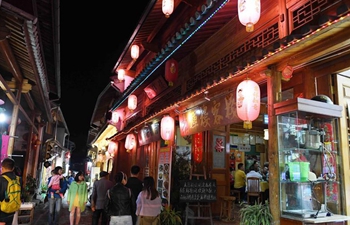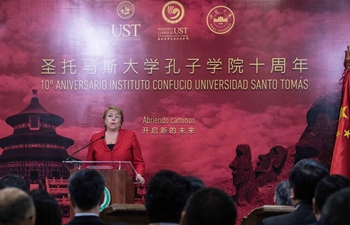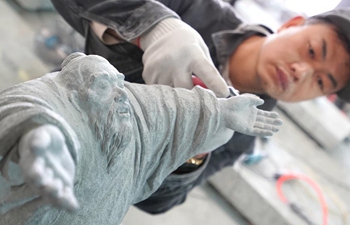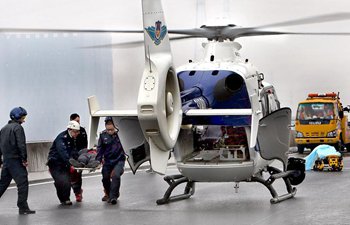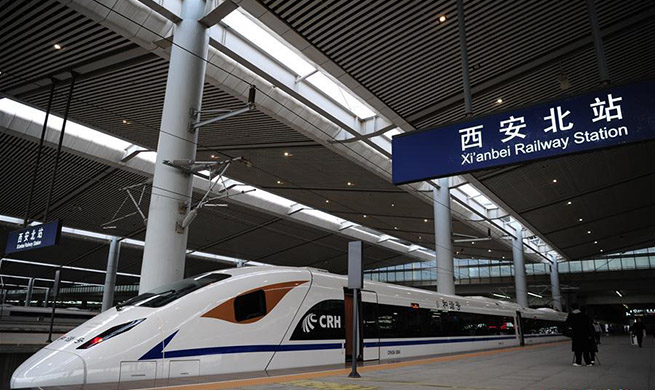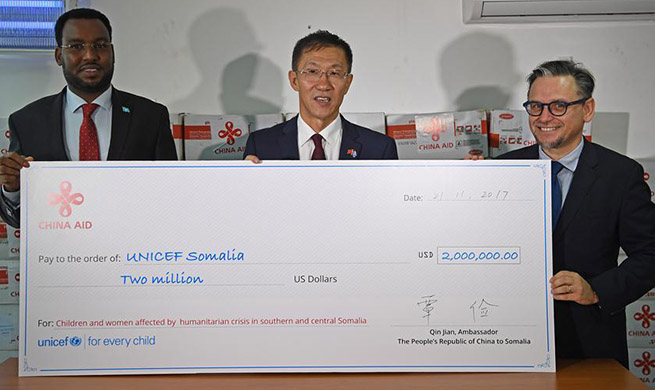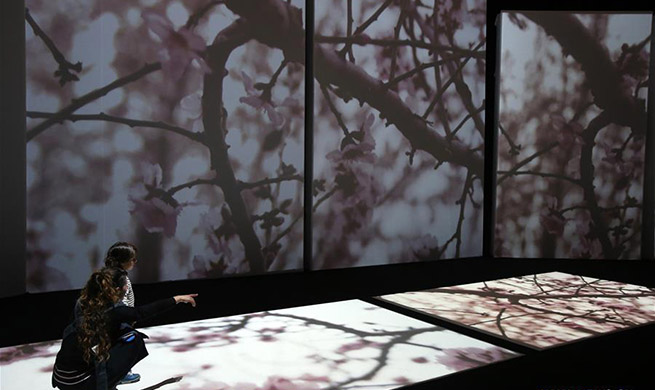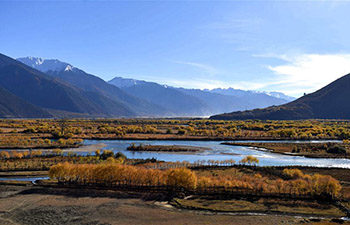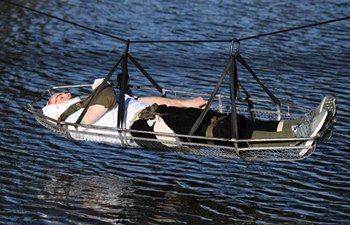ISTANBUL, Nov. 22 (Xinhua) -- Turkey's enmity toward Syrian Kurdish militia is what cannot be avoided when the presidents of Russia, Turkey and Iran meet in the Russian resort of Sochi Wednesday on the future of Syria, where anti-terror military operations are coming to an end, analysts said.
Russian President Vladimir Putin is expected to usher in a political process for Syria, which has withstood the ravages of years-long war, through increasing cooperation with his Turkish and Iranian counterparts, Recep Tayyip Erdogan and Hassan Rouhani, with focus on bringing warring parties toward reconciliation and peace.
Moscow has been working lately to host a Syrian Congress on National Dialogue, an anathema to Ankara, which has treated the Syrian Kurdish militia known as the People's Protection Units (YPG) and its political wing the Kurdish Democratic Union Party (PYD), as terror groups.
The Kurds' participation in the congress is out of the question given Turkey's opposition, said Huseyin Bagci, a professor of international relations with the Ankara-based Middle East Technical University.
Noting Iran has been fighting against Kurdish separatism as Turkey is, he told Xinhua, "If Turkey and Iran push for the exclusion of the Kurds, Russia may well take a step back."
Moscow is known to be favoring the participation of the PYD in the congress as well as the Geneva peace process, while Ankara argues that it would mean legitimizing a terrorist group.
"That would not mean, however, that Russia and the U.S. would not separately talk with the Kurds for a political settlement," said Bagci.
Russia, Turkey and Iran are sponsors and guarantors of the Astana peace process, which has led to the establishment of cease-fire and de-escalation zones in four areas of Syria.
Deeply frustrated with U.S. military support to the Kurdish militia, Ankara started last year to work with Moscow and Tehran toward peacemaking in Syria, which led to the Astana process.
"The cards Turkey has in hand would not allow it to be against Kurds' participation," observed Hasan Koni, a professor of public international law at Istanbul Kultur University.
The summit on Wednesday is the first among the leaders since Syria was plunged into turmoil in 2011. President Erdogan on Tuesday described it as one that would be very important for the future of the region.
What Turkey has gained by building close ties with Russia is important despite some lingering differences of opinion on some issues, the Turkish leader said.
Given its strained relations with the U.S., Turkey would not be in a position to say "no" to the Russian demand for a Kurdish autonomous region in Syria, Koni argued.
"It's certain that Turkey will not be participating in the meetings in which the PYD will be present," said Murat Bilhan, deputy chairman of the Istanbul-based Turkish Asian Center for Strategic Studies.
In his meeting with President Putin in Sochi on Tuesday, Syrian President Bashar al-Assad voiced his readiness to have a dialogue with any party eager to be part of the political process, while his Foreign Minister Walid al-Moualem said in September that Kurdish autonomy was negotiable for Damascus.
Koni feels that Ankara may be talked into changing its attitude after being offered some guarantee about the PYD.
Noting Russia does not want to leave the Kurdish card into the U.S. hand, he said, "Iran is also the enemy of the U.S., so Turkey may feel the need to cooperate with Russia and Iran against the U.S. for the moment."
Ankara has often accused Washington of working toward a Kurdish state in northern Syria, as the YPG has established three autonomous cantons along the Turkish border with U.S. support.
The Kurdish militia is estimated to control around 30 percent of the Syrian territory as well as the country's major oil and water resources.
Erdogan should be able to talk Putin into excluding the Kurdish militia from the congress on national dialogue, said Bilhan, a former diplomat.
Saying there has been an understanding between the two countries for some time and Russia needs Turkey in the region, he argued that this balance of mutual interests would block the YPG from being part of the peace negotiations.
The foreign ministers of Turkey, Russia and Iran met in Turkey's Antalya on Sunday, but apparently failed to reach an understanding on the PYD issue.
Whether the Kurds will be invited to the congress will be tackled at the leaders' summit in Sochi, Yuri Ushakov, a Kremlin foreign policy aide, told reporters on Monday.
Prior to the summit, top generals of the three countries gathered in Sochi on Tuesday, where the chiefs of the General Staff reportedly reached an agreement on concrete steps to be taken to eliminate the Islamic State and the al-Nusra Front in Syria.
The Islamic State and al-Nusra Front, recognized as terrorist groups, have been excluded from the Astana peace process.
In addition, the generals agreed on measures to increase the level of coordination among the three guarantors in the Syrian province of Idlib, one of the four de-escalation zones.
Turkey sent troops to Idlib last month to monitor truce between rebel groups and the Syrian military.
Koni does not believe Ankara has much room for manoeuver.
Stressing that Turkey would not be able to side with the U.S. under the circumstances, he said Ankara may have to agree to the Kurds' inclusion in the talks.
"There is no way out," he added.
The Sochi summit and the congress on national dialogue being prepared are expected to lay the ground for the settlement of the Syrian conflict at the U.N.-sponsored talks in Geneva.
In the view of Koni, Turkey may accept in Sochi a Kurdish autonomy on the eastern part of the Euphrates River in return for the YPG's departure from Afrin, a Kurdish canton in northwestern Syria and the only one on the western side of the Euphrates.
Ankara has said it sees the YPG presence on the western bank of the river as a red line for its national security.
"If al-Assad agrees to give autonomy to Kurds, Ankara has no chance of blocking it," said Koni.





